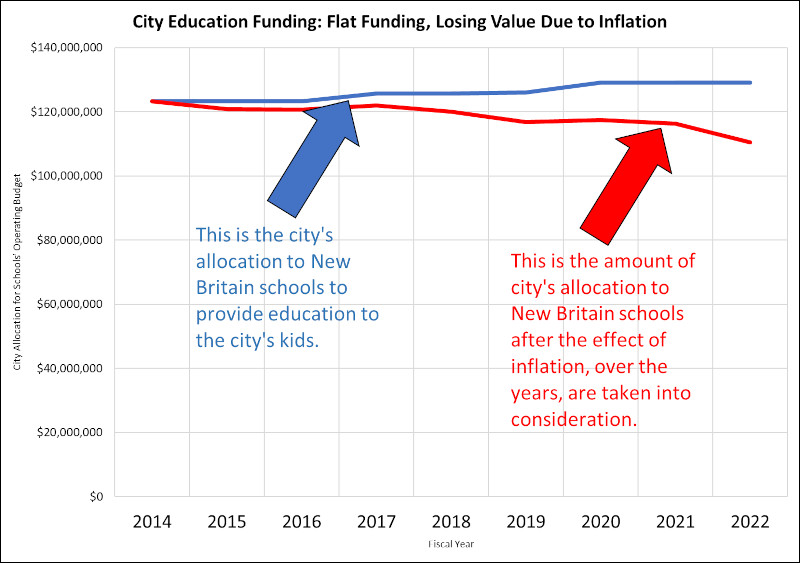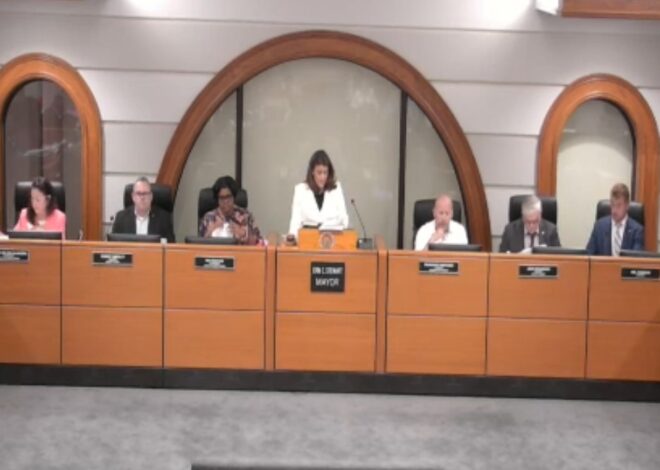Former Democratic Mayoral candidate Alicia Hernandez Strong and others are criticizing Republican Mayor Erin Stewart’s campaign claims on education funding.
Among other claims in a campaign flyer, Stewart said that she, “Increased City funding to the Board of Education by an additional $45 million.”
“She did not increase school funding by $45 million,” Strong commented.
“In her entire tenure as mayor (since 2013) she increased the Board of Education budget by 2 million one time,” Strong added. “I assume here she is taking credit, again for federal and state dollars received by the district.”
The city’s allocation to the operating budget of New Britain schools used to provide education to New Britain’s children has increased just 2% over the entire eight years of Stewart’s administration. The total of $2,495,000 amounts of an average annual increase of just $311,875 – a quarter of a percent increase per year.
In the 2020 budget year, Stewart did propose, and the Council approved, a transfer to the school system of the money from a grant that the state provides to the city to support special education. That special education grant, averaged about $3.3 million per year between the 2016 and 2019 budget years.
But, even counting that state special education money in the schools budget appears to have only increased Stewart’s average annual education increase to six-tens of a percent per year. That is largely because the 2020 special education transfer, even continued year-over-year, only amounted to a one-time increase in the schools budget. Since then, Stewart’s budget has not increased operating funds to the city’s schools at all.
In her state of the city comments, earlier this year, Stewart bluntly said that her longstanding policy of low-funding to New Britain’s schools would continue in the city budget. Stewart curtly said that, “what I will not do is blindly throw additional tax dollars into a massive bureaucracy that is failing our students.”
Stewart essentially admitted, that she has flat-funded the city’s schools, saying, “Every year, the Consolidated School District of New Britain receives about $126 million of taxpayer money, and today, it is dead last, when every metric within the state of Connecticut education performance index.”
The large contrast between those earlier comments and facts, on the one hand, and Stewart’s recent campaign claim of increasing schools funding by $45 million, on the other, has been surprising for many.
Even adding up the cumulative amount of schools funding above the level it was when Stewart began as mayor only adds up to $15 million, nearly $30 million less than Stewart’s claim. Adding to that the cumulative amount of the state special education grant money since the 2020 fiscal year appears to still leave the total nearly $20 million less than Stewart’s claim.
But examining the cumulative total over the past eight years also bring into the question of the effects of inflation over those years.
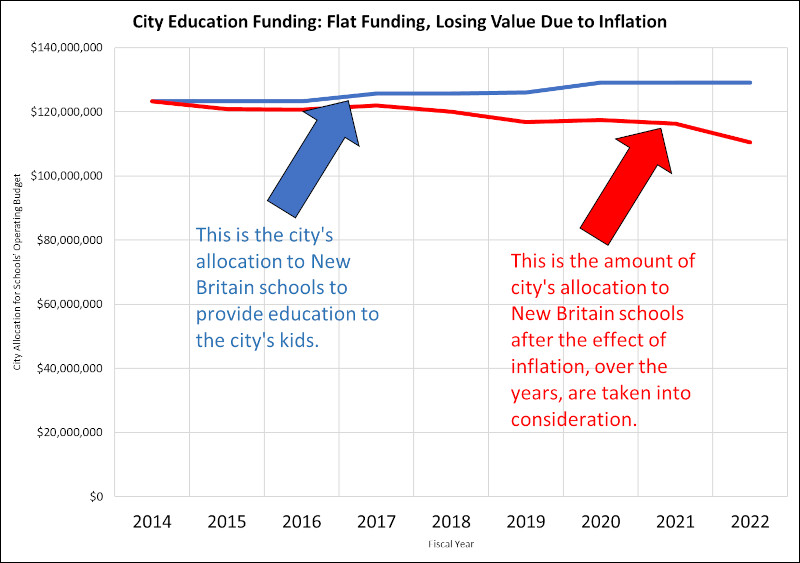
After the effects of inflation, city funding for the schools’ operating budget appears to have decreased, rather than increased. That decrease appears to now amount to nearly $13 million this budget year.
In fact, taking inflation into consideration, the cumulative decrease, not increase, in schools operating funding since Stewart began as mayor appears to be more than $41 million.
While Stewart had said that low test scores were her reason for providing not an increase in the schools’ operating budget, critics have pointed to her flat-funding of schools as an important reason for those low academic scores.
The New Britain Progressive reported in 2019 that, despite New Britain receiving, “the fifth highest state Education Cost Sharing grant funding of all of the cities and towns in the state,”
New Britain’s own local commitment to education, on the other hand, is among the lowest municipal school districts in the state. Only Bridgeport allocated less local funding per student than New Britain in the 2015-2016 state data.
While New Britain residents have less money than the state average to fund local services, the New Britain Progressive reported that, even looking at a percent of the city’s ability to pay, the city of New Britain still appeared to allocate to its schools, “the second lowest among municipal school districts in the state.”
Hartford’s contribution was not in that data and may have been lower, still, which would have made New Britain third lowest.
The New Britain Progressive also reported in 2019 that,
Comparing the amount of local support for education, using the 2015-2016 data, to the most recent academic test scores appears to show a general correlation between how much a city or town provides in local funding for their schools and the test scores of the students in their schools. The comparison appears to show New Britain’s place near the bottom of both local education funding and test scores as part of a larger pattern, with New Britain near the low end of the scale.
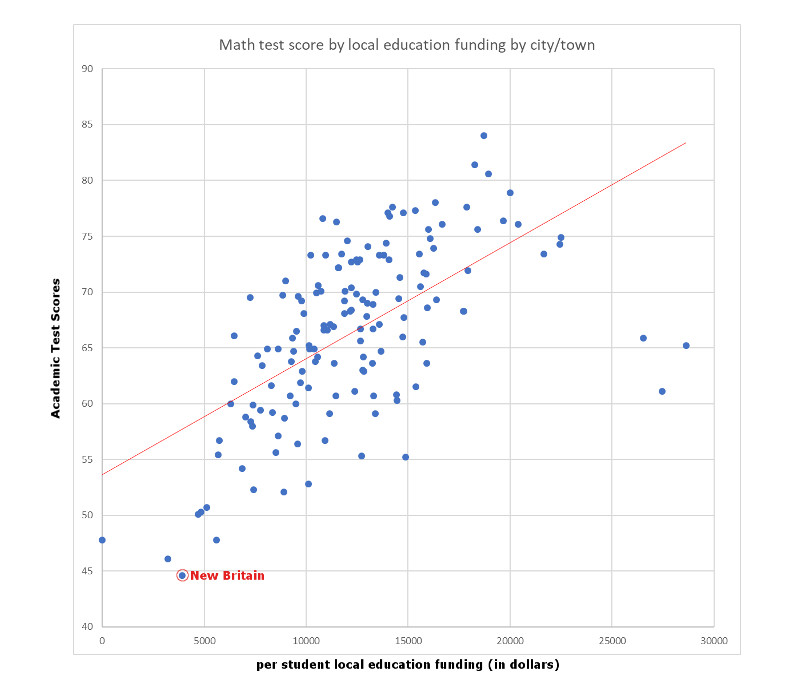
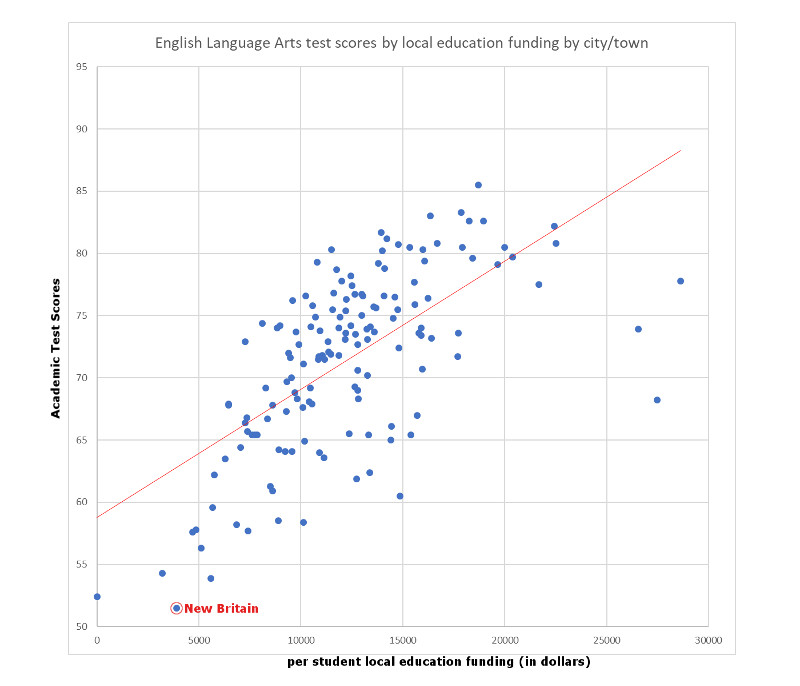
In 2019, the New Britain Progressive reported that, at that time, it appeared that it would have taken a $14 million or more per year local education funding increase from the city to get the city up to the average amount cities and towns spent as a portion of their local ability to pay, apparently leaving New Britain’s city commitment to annual school operating budgets far behind the benchmarks that appear correlated with higher educational outcomes.
Many have accused Stewart of obfuscating the city’s responsibility for supporting the education of New Britain’s kids, with some speculating that Stewart does not consider it the responsibility of the city at all. The city’s schools have relied heavily during Stewart’s administration on increases in state aid brought into the city by the governor and the city’s state legislative delegation.
“Stewart repeatedly takes credit for the work of non-profits, businesses, and state/federal government officials,” Strong said recently. “But the reality is, a vast majority of major investments in our city have not been funded by the city. The Stewart Administration continues to underfund education.”
“Don’t believe the lies,” Strong added of Stewart’s campaign claims.

